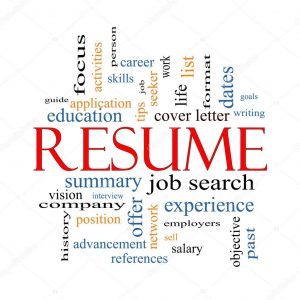It’s not surprising that many people describe looking for a job after a long work absence as ‘job-hunting’ because it’s just that, a breathless pursuit that often tires a person out. If this statement rings true to you then you understand that the struggle is real. You’re definitely not alone, this is a common experience even though not everybody talks about it publicly.
 Back to the future
Back to the future
Before I get to the instructional “how to’s” of job hunting, I want to explore the “how come” and why it can be so hard to track down and obtain work. One contributing factor for some of my clients is that they’ve been absent from the workforce for a significant amount of time.
Someone who is attempting to re-enter the workforce can feel disconnected from the changes that have happened in recent years. Some of these changes include radical transformations in their industry, such as different technologies, systems, and expectations regarding overtime hours. Plus, the way that people apply for jobs is different.
One client explained that after being absent from her administrative job for over 5 years due to illness she said “I’m utterly overwhelmed by the online job application screening questions, I’ve never had to give this much information to find a job before, but now it seems they need my blood type before I can even get an interview.” Of course, this isn’t actually true, but clearly, she’s noticed that the technological shift in applying for jobs does not give her much opportunity to explain her absence from the workforce. Recovering from personal setbacks and remaining resilient while re-establishing a career is hard enough so it’s even more difficult when the mechanics of a job search becomes a barrier.
Another common problem is not having any fresh leads about job opportunities from friends and/or acquaintances. This is because when you’ve been preoccupied with illness or overwhelmed by caring for an ailing family member for many years it’s easy to lose track of those important contacts. When we’re busy and disconnected, it’s definitely challenging to do the networking that’s necessary for discovering the better employment opportunities that don’t get posted publicly. Face-to-face networking is valuable but it’s also important to make use of digital opportunities like LinkedIn/LinkedIn groups, Twitter, and Facebook groups for ways to connect with people who have common and/or complementary professional interests.
 Sometimes, absence makes the heart grow fonder … but what about in the workplace?
Sometimes, absence makes the heart grow fonder … but what about in the workplace?
What should you do when you’re submitting a resume that states that you had the same job title from 1995 to 2010 and then … nothing? This 8-year gap on paper almost screams “where have you been?” Unless you can clarify the reason for your extended work absence, and reassure a future employer that whatever took you out of the workforce is resolved and won’t be an issue going forward, it’s likely that your application will be rejected. Of course, this isn’t fair, but if you’ve lived long enough you know that life has a way of interfering with the timing of personal and professional goals – sometimes with little warning. Often, a work absence can be for a wonderful reason such as starting and raising a family or relocation with a spouse/partner.
I’ve only had one extended absence from a traditional job when I took a 13-month maternity leave. Since this was a typical absence, it really didn’t require much explaining. I also have a specialization in a field of work that does give me more job security than some other fields provide. I believe that it can be more challenging for some stay-at-home parents who have limited work experience or education. It’s also hard if the job that a person left has been filled, relocated, or no longer exists.
 Back in the saddle again … how to ride back into the workforce
Back in the saddle again … how to ride back into the workforce
1) If you’re lucky enough to have access to the same job after an extended absence you’ve already made it past the largest hurdle associated with returning to work after an extended absence. Even if the availability of a job isn’t a problem, you may experience other difficulties such as feeling socially or professionally disconnected and/or intimidated (e.g., the impostor syndrome). You will probably have to relearn some aspects of your new or old role, which will have drastically changed. There may be new management and/or coworkers to adjust too. Being aware that it will take time to reassert your role and presence is a good start. Often our pride/ego can take a hit when we are humbled by changes in the workplace, so try to stay calm and be patient when getting back to your work routine and role.
2) It’s never too late to reinvent yourself after being away from the workforce. Perhaps your last job is no longer available, and you need to figure out how to use your existing skills and abilities in a different role or context. If this is too daunting or you know that you’d benefit from an objective perspective, then it’s the perfect time to see if a skilled career coach (like me!) can help you find a way forward.
3) I’ve written about the value of cover letters in the past (click here to read more). A carefully crafted cover letter can be your best cover story after a long absence.
4) After constructing a thoughtful cover letter that showcases your strengths for the intended job it is also wise to identify 2 or 3 people who are willing to vouch for you as references. This way, when you’re asked by a future employer for references you’ll already have them in mind. You should help them prepare by reminding them of the work you’ve done so that when they’re asked, they’ll be better able to recall. Seeking the permission of your references to share their name and contact information with a potential employer gives them a ‘heads up’ that you’re searching for work. They may even be willing to help by making an introduction or two. If you have been away from the workforce for longer than 2 to 3 years, then you may need to branch out to respectable professionals and/or people who know you from the volunteer sector who can vouch for your work ethic and character.
Need help dealing with a delicate or high-stakes career or HR issue? I invite you to contact me privately. I offer a free 15 to 20-minute initial consultation by phone. Or, if you prefer, you can contact me by email, or via direct message on Twitter, Facebook, or LinkedIn.
More than career coaching, it’s career psychology®.
I/O Advisory Services – Building Resilient Careers and Organizations.
Easily share this article using any of the social media icons below!



